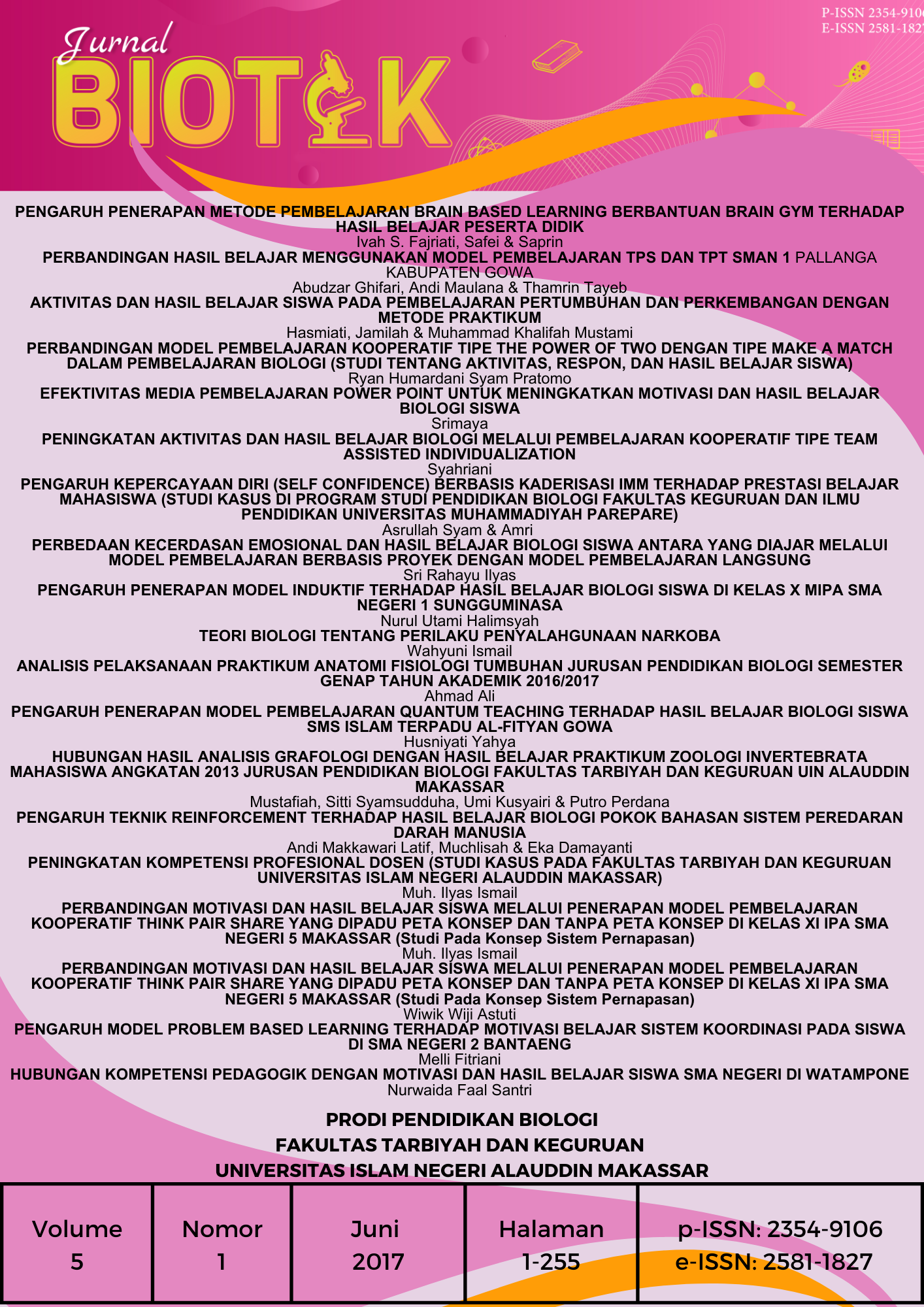PENGARUH PENERAPAN MODEL INDUKTIF TERHADAP HASIL BELAJAR BIOLOGI SISWA DI KELAS X MIPA SMA NEGERI 1 SUNGGUMINASA
Abstract
Inductive learning model is a learning model that has three phases, namely the formation of concepts, data interpretation and application of the principle. The influence of implementation inductive model in improving learning outcomes of grade X MIPA student at SMAN 1 Sungguminasa. The study is a quasi-experement with nonequivalent control group design. The population of the study was grade X MIPA students of the second semester of academic year 2016/2017 in SMAN 1 Sungguminasa. The results of the study reveal that the implementation of inductive model significant influence toward learning outcomes students.
Downloads
References
Arikunto, Suharsimi. (2009). Dasar-Dasar Evaluasi Pendidikan. Jakarta: Bumi Aksara
Djamarah, Syaifil Bahri & Zain, Aswan. (2010). Strategi Belajar Mengajar. Jakarta: PT. Rineka Cipta
Hamalik, Oemar. (2004). Proses Belajar dan Mengajar. Jakarta: Bumi Aksara.
Joyce, Bruce., Weil, Marsha & Calhoun, Emily. (2000). Models of Teaching. London: Allyn & Bacon.
Joyce, Bruce., Weil, Marsha & Calhoun, Emily. (2011). Models of Teaching. Yogyakarta: Pustaka Pelajar
Julianto, Toni. (2012). Pembelajaran Induktif dan Pembelajaran Deduktif. http://tonijulianto.wordpress.com/2012/07/12/pembelajaran-induktif-dan-pembelajaran-deduktif/. Diakses pada tanggal 12 September 2013.
Karlinger, Fred N. (2006). Asas-asas Penelitian Behavioral. Yogyakarta: UGM
Majid. 2008. Perencanaan Pembelajaran Mengembangkan Standar Kompetensi Guru. Bandung: Remaja Rosdakarya
Rusyan, A. Tabrani. (2006). Kunci Belajar Sukses. Bandung: Sinergi Pustaka Indonesia
Sabri, Ahmad. (2010). Strategi Belajar Mengajar dan Micro Teaching. Padang: PT Ciputat Press
Slameto. (2003). Belajar dan Faktor-Faktor yang Mempengaruhinya. Jakarta: Rineka Cipta.
Subali. (2002). Penilaian Pencapaian Hasil Belajar Biologi. Yogyakarta: Universitas Negeri Yogyakarta.
Trianto. (2011). Desain Pengembangan Pembelajaran Tematik. Jakarta: Kencana Prenada Media Grup
Authors who publish with Jurnal Biotek agree to the following terms: Authors retain the copyright and grant Universitas Islam Negeri Alauddin Makassar right of first publication with the work simultaneously licensed under a Creative Commons Attribution License (CC BY-SA 4.0) that allows others to share (copy and redistribute the material in any medium or format) and adapt (remix, transform, and build upon the material) the work for any purpose, even commercially with an acknowledgement of the work's authorship and initial publication in Universitas Islam Negeri Alauddin Makassar. Authors are able to enter into separate, additional contractual arrangements for the non-exclusive distribution of the journal's published version of the work (e.g., post it to an institutional repository or publish it in a book), with an acknowledgement of its initial publication in Universitas Islam Negeri Alauddin Makassar. Authors are permitted and encouraged to post their work online (e.g., in institutional repositories or on their website) prior to and during the submission process, as it can lead to productive exchanges, as well as earlier and greater citation of published work (See The Effect of Open Access).

This work is licensed under a Creative Commons Attribution-ShareAlike 4.0 International License.



